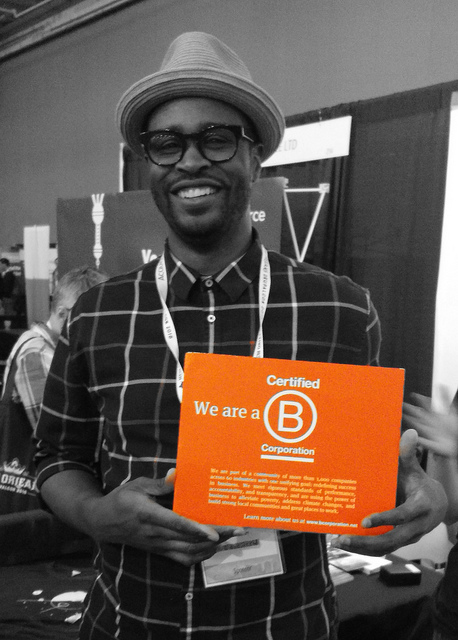Beyond CSR: Can Business be a Force for Good?
on
This article was initially posted on July 7, 2016 in the Green Ottawa: Gateway to a green, sustainable Ottawa.
 Are you an entrepreneur who would like to run your business in a way that also benefits society and the environment? Or are you a consumer who would like to deal with some of the most ethical, sustainable firms? “B Corporations” may be what you’re seeking. There are now 155 “B Corps” in Canada, including 72 in Ontario.
Are you an entrepreneur who would like to run your business in a way that also benefits society and the environment? Or are you a consumer who would like to deal with some of the most ethical, sustainable firms? “B Corporations” may be what you’re seeking. There are now 155 “B Corps” in Canada, including 72 in Ontario.
My first experience with the concept of Fair Trade was in a church basement in the 70’s. It’s grown a lot since then. I was fortunate to have worked at Bridgehead back before it was a popular Ottawa coffee shop, but rather sold wholesale goods that had been ethically produced. I was able to watch the formation of Fair Trademark Canada, and the growth of brand awareness that grew in Canada as people began to realize the impact that basic routines like buying their morning coffee, could have on people on the other side of the world. We’ve come a long ways since then and there are many other brands out there for consumers who want to purchase products that can help in some small way to leave the world a little better off.
I own a small web development company that has been creating web applications and websites using open-source software since we set up shop in 1999. Since I started this company I have been thinking about how to be an ethical company and respect the environment, my staff and hold to the broader principles which I believe in. Running a business is a pretty amazing ride and most support for small business owners is focused on how to grow your business and become more profitable. Those aren’t necessarily bad things, but many companies have taken this to an extreme which are not healthy for the environment, the company’s staff or the communities they are based in.
I was immediately interested in the idea of Certified Benefit Corporations (or BCorps) but didn’t see how I could benefit. I felt that there really wasn’t much that my small business could do to reduce our footprint or increase our impact on society. It seemed like a good idea for others, but something that there really wasn’t much that OpenConcept could learn from. Fortunately, I was wrong about this.
We certified for the first time in 2013 and recently completed the recertification process for the first time. To become a BCorp, businesses must complete an Impact Assessment which is managed by a non-profit called BLabs. This is essentially a long questionnaire which asks organizations to give information on their governance structure, their environmental footprint, their human resources policies and more. This survey is constantly being updated to ensure that it is able to keep up with best practices of the BCorps community. The Impact Assessment is free for anyone to try and it most organizations can benefit from taking it: http://bimpactassessment.net/
Each BCorp has the results of their Impact Assessment publicly displayed on the BCorp website. Ours can be found here:
http://www.bcorporation.net/community/openconcept-consulting-inc
What I realized is that there are really so many ways that organizations can be better. If we simply look at organizations immediately around us then it is pretty easy to be happy with things like making less use of the furnace or air-conditioner. These are good things, but are really nothing when compared with the work that global leaders like Patagonia and Ben & Jerry’s are doing to leverage their brands to increase their impact.
In 2014 & 2016 we got an award from BCorps as being one of the Best for Workers. We are always looking to find ways to make the world a better place with open-source software. As a software development company, it is hard to support a work-life balance for our employees, but the BCorp framework helps us keep this best practice in focus.
We have published several articles and made presentations on the exponential growth of energy consumption from Information Communications Technology and highlighted approaches that sites can take to reduce their load. This was done in conjunction with other BCorps who are working to raise awareness about the invisible costs of our industry. With climate change, everyone needs to do all that they can to reduce our impact.
By joining BCorps like this, OpenConcept is being challenged to do more. A few things that we now have more incentives to do include measuring CO2 emissions, setting up a recycling program and keeping track of our water usage. We have also set up a procurement policy which is there to encourage us to think more carefully about what we buy. We can now also compare this year’s score with what we did two years ago to help us evaluate how we can do better in the future.
Like other BCorps we believe that it is important to Measure what Matters. When you are buying products and services, take the time to look for the BCorp Brand.
Share this article
About The Author
Mike Gifford is the founder of OpenConcept Consulting Inc, which he started in 1999. Since then, he has been particularly active in developing and extending open source content management systems to allow people to get closer to their content. Before starting OpenConcept, Mike had worked for a number of national NGOs including Oxfam Canada and Friends of the Earth.




Add new comment